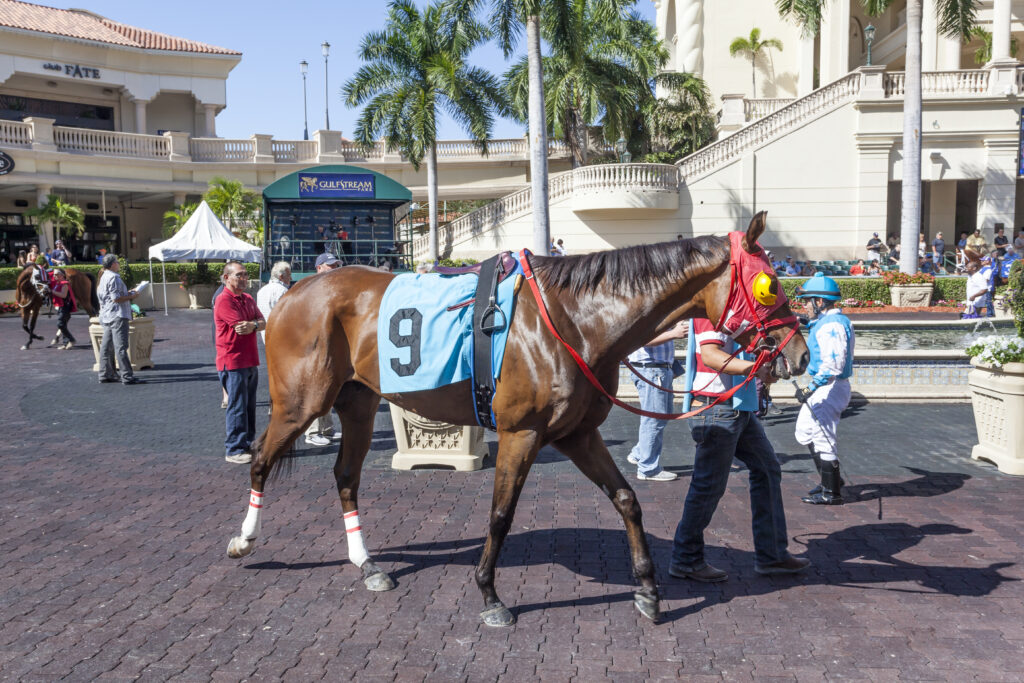Gaming bill looks lift some horse racing requirements

HALLANDALE BEACH, USA – MAR 11, 2017: Racing horses show at the Gulfstream Park race track in Hallandale Beach, Florida, United States

A thoroughbred race horse is shown walking at the Gulfstream Park race track in Hallandale Beach in this file photo. The state Legislature is considering changes to pari-mutuel requirements. [Stock image]
But every year, a deal satisfactory to all the players in the complex issues fails to emerge.
The House, the Senate, the governor and the Seminoles are the central figures in trying to reach a deal, known as a “compact.” But the talks also include horse racing and jai alai pari-mutuel operators and global casino giants willing to drop big bucks in the state to tap into the tourist market and a growing affluent population.
Marion County, the heart of the state’s thoroughbred breeding and training farms, follows the yearly discussions closely. The Florida Thoroughbred Breeders’ and Owners’ Association, based in Ocala, is one of the players in the discussions, urging legislators not to do away with a requirement that pari-mutuel facilities conduct live horse racing to offer more lucrative card rooms, a process known as “decoupling.”
While the larger compact discussions continue, this week the Senate Regulated Industries Committee approved a decoupling bill (SPB 7080) that would allow pari-mutuels that have harness racing, quarter-horse racing and jai alai to drop the performances and allow them to keep operating the cardrooms. Thoroughbred racing would remain coupled at Gulfstream Park in Hallandale Beach and Tampa Bay Downs in Hillsborough County.
In south Marion County, Oxford Downs operates a quarter horse facility that critic slam as a sham because of the lack of racing facilities, the use of non-professional jockeys and non-racing quarter horses. The facility also operates a cardroom that grossed more than $3.1 million between July and February, according to the state records.
Up north, near Orange Lake, Ocala Gainesville Poker and Jai Alai also has been blasted by critics for putting on lower-level jai alai performances. That cardroom pulled in less than $700,000 from July to February, state reports show.
Florida voters in 2018 approved a constitutional amendment that banned live greyhound racing at the state’s dog tracks but allowed operators to continue to conduct card games and to offer slots in South Florida.
Thoroughbred breeders and owners support the current Senate plan, but a Gulfstream executive told the Senate panel Monday that allowing other pari-mutuels to do away with live racing and jai alai would put the track at a disadvantage in South Florida.
“The consequences of creating an uneven playing field among slot permit holders would be devastating to the Florida thoroughbred industry, which is one of the largest agricultural sectors in the state of Florida,” said Mike Rogers, president of the Stronach Group, which owns Gulfstream.
Rogers noted that Florida first authorized pari-mutuel wagering in 1921.
“We’re very concerned that this path could jeopardize thoroughbred racing on its 100th anniversary,” he argued.
The Senate proposal would allow the state’s only harness-racing track – Isle Casino Pompano – to do away with horse racing and keep slots and poker.
But Sen. Ray Rodrigues, R-Estero, questioned the rationale behind decoupling harness racing while requiring thoroughbred tracks to continue live races.
“I think everyone has seen that with the quarter horses and the standard quarter horses and the jai alai, that many of the facilities that are doing that are really just going through the motions. I don’t think most people would view what’s happening there as legitimate contests,” Rodrigues said.
Thoroughbred races are “legitimate races, competitive contests … so excluding them, I think, that makes sense,” he added.
Harness racing “also appears to be legitimate,” Rodrigues said, asking committee Chairman Travis Hutson what the “thought process” was behind allowing harness racing to decouple.
Hutson, who sponsored the bill, said thoroughbred track owners did not want to be included in the decoupling plan but harness-racing permit holders “did not have that same vibe.”
“They were kind of 50-50 on whether they wanted to be decoupled or not,” Hutson, R-St. Augustine, added.
The Florida Standardbred Breeders & Owners Association, however, opposes the approach.
Harness racing or standardbred racing “enjoys a tradition in Florida that is over half a century-long, and it’s doing quite well,” Lauren Jackson, a lobbyist for the organization, told the panel.
“If the casino that holds the sole harness-racing permit is allowed to decouple, the entire industry would be left with nowhere in the state,” she said.
Rodrigues voted in favor of the measure Monday, but expressed reservations.
“The testimony we’ve heard today does concern me, particularly because I think harness racing is still legitimate racing,” he said.
Under the other measure approved by the committee Monday, members of the proposed gaming commission would be appointed by the governor and require Senate confirmation.
The House Commerce Committee is slated to consider similar proposals this week.
The Ocala Gazette contributed to this report.





